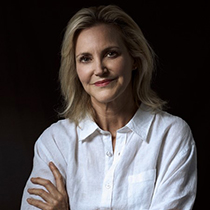
By the Honorable Melissa Parke, former Rotary Youth Exchange student, former Australian Minister for International Development, and Executive Director of the International Campaign to Abolish Nuclear Weapons (ICAN)
I grew up on an apple farm outside a small town called Donnybrook in the southwest of Western Australia. When the Donnybrook Rotary Club advertised they were seeking applications from year 10 students to spend a year abroad, I was very excited. I applied and was ultimately selected to be hosted by the Rotary Club of Maubeuge in northern France.
I had never been outside the state or travelled on a plane before, so it was a grand adventure from the very beginning. I saw snow for the very first time the day I arrived! This was a big shock given that it had been 40 degrees Celsius (104 degrees Fahrenheit) the day I left Australia.
I had wonderful host families in France and learned another way of life, a different culture. I also learned to appreciate champagne, cheese, and a good baguette, as well as to speak French. Little did I know at the time that speaking French would come in very handy in my career.
Upon my return to Australia, I trained and worked as a lawyer for a number of years before taking up a role as an international lawyer with the United Nations, where I lived in places like New York, Kosovo, Gaza, and Lebanon. I worked as the deputy chief of staff and legal adviser in the UN International Independent Investigation Commission in Beirut, investigating the assassination of the former Lebanese prime minister Rafik Hariri and other terrorist attacks in Lebanon.
My experience as a Rotary Youth Exchange student had inspired me to experience more places, cultures, and languages, and to help those less fortunate around the world as an international civil servant. I saw firsthand the impact of war on civilians and the tragedy of people displaced from their homes, everything and everyone they loved.
My experience even inspired my sister Georgina to become a Rotary Youth Exchange student in Japan. She is now an internationally renowned wildlife photographer.
After many years of working with the UN, I returned to Australia and was elected to parliament where I served three terms (nine years) as the Federal Member for Fremantle and was appointed as Minister for International Development. Again, my experience as a Rotary Youth Exchange student had led me to seek out further ways to serve the public interest.
During my time as an MP, I was delighted to see Rotary International partner with Global Citizen to Make Polio History, and I was part of the Australian government that contributed $50 million to the Global Polio Eradication Initiative in 2011. As of October 2022, Australia has donated over $155 million.
Following my retirement from parliament, I served for four years as a member of the UN Human Right’s Council’s Group of Eminent Experts on Yemen. I also became an Ambassador for ICAN Australia, since I was very aware of the devastating impact of British nuclear weapons testing in the 1950s and 60s in Australia. The primary victims of this and other testing by France, Britain, and the U.S. in the Pacific had been Australia’s indigenous peoples.
In 2017, ICAN won the Nobel Peace Prize for its work highlighting the humanitarian consequences of nuclear weapons and for helping to get a new UN Treaty on the Prohibition of Nuclear Weapons adopted at the UN General Assembly, with the support of 122 countries.
There have been more than 2,000 nuclear weapons tests carried out around the world. Today’s nuclear weapons are many times more powerful than the atomic bombs dropped in 1945 on Hiroshima and Nagasaki that killed a quarter of a million people. Nuclear weapons are the only devices ever created by humans that have the capacity to end all complex life on this planet. In Nature Food journal in 2022, scientists confirmed that even a ‘limited’ nuclear war involving only 2% of the global nuclear arsenal would kill 120 million people outright and cause global climate disruption, leading to agricultural collapse and the further death of at least 2 billion people from starvation in a nuclear winter.
A major nuclear war would end human civilization and most other life forms.
The fact that we are still here to talk about nuclear weapons after 79 years is not a result of good management or the inherent stability of nuclear deterrence. Many accidents and nuclear near-misses over the decades have avoided disaster only through sheer luck.
As the UN Secretary General Antonio Guterres said in 2022, “Luck is not a strategy.”
The Secretary General’s New Agenda for Peace, released last July, has as its number one recommendation the elimination of nuclear weapons. At this time of heightened global tensions and major conflicts involving nuclear-armed states, it has never been more urgent or important for the international community to take action to eliminate these weapons of mass destruction.
Editor’s note: As a membership organization advancing humanitarian causes, promoting peace is a cornerstone of our mission. Rotary recognizes nuclear non-proliferation is an important issue, and we know that many members and friends are deeply passionate about such efforts. However, Rotary believes that we can best support lasting peace by enhancing our current peace fellowship program and peace-focused community service projects. If Rotary members wish to engage in advocacy regarding nuclear disarmament, they can do so as a private individual.
https://blog.rotary.org/2024/10/08/former-australian-mp-shares-impact-of-rotary-youth-exchange/
